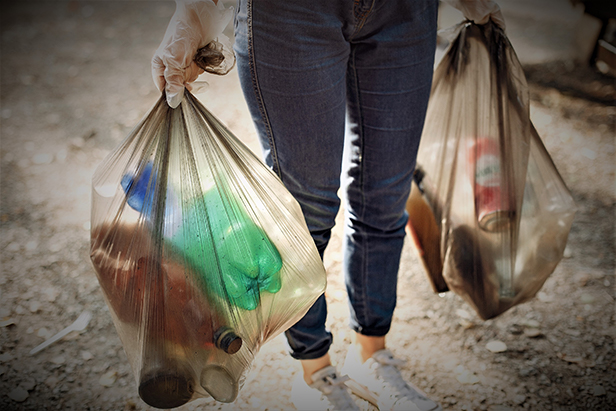February 17, 2021
ChicoBag Among Winners of ‘Beyond the Bag’ Challenge
The California-based supplier unveiled a “bags as a service” solution to help encourage the use of reusable bags at stores. It was one of nine winners in a collaborative competition to help reduce plastic bag waste.
We may be one step closer to moving beyond the single-use plastic bag.
The Center for the Circular Economy at Closed Loop Partners this week announced nine winners of its Beyond the Bag Challenge, which called for innovative ways to combat plastic waste. Among the winners is California-based promotional products supplier ChicoBag (asi/44811). ChicoBag and the other eight winners will receive a portion of $1 million in prize money and are eligible for additional financial support for testing, piloting and scaling efforts of the solutions they presented in the challenge.
Congratulations to the 9 #BeyondtheBag Challenge Winners! Our Consortium to Reinvent the Retail Bag is proud to announce the reuse and refill models, enabling technologies and innovative materials paving a more sustainable future for the retail industry. https://t.co/3kkAftC8dM pic.twitter.com/XBojlxx2N0
— Closed Loop Partners (@LoopFund) February 16, 2021
“We’re honored to be selected as a winner of the Beyond the Bag Challenge,” said Andy Keller, founder and president of ChicoBag. “It’s a privilege to stand alongside other innovators in the sustainability space and work together toward alternatives to the current retail bag.” He added that the efforts by Closed Loop Partners are a “giant step forward for the retail industry’s impact on the environment.”
ChicoBag came up with a “bags as a service” solution, which was selected for its long-term value, inclusive convenience, effectiveness and environmental impact. Here’s how it would work: When shoppers buy their groceries, they would have the option of paying a deposit for a high-quality reusable bag, which they can then use as many times as they want. When the shopper is ready to return the bag, they would get their deposit back from the store, and the store would gather the returned bags, launder and inspect them, then return them to circulation. “Each bag has a unique identifier,” Keller said. “You’re basically checking the bag out like you would a library book.”
ChicoBag’s solution is also designed to make reusable bags an option for online orders prepared for curbside pickup, which has become particularly relevant in the age of COVID. Stores typically don’t have the option for reusable bags with curbside pickup, since it would be logistically difficult for the shopper to provide their bags in that scenario. The “bags as a service” model would solve that issue, Keller said.

Other winning solutions involved reusable packaging systems, technology to incentivize consumers to make sustainable choices and bags derived from seaweed or agricultural waste. You can read more about the winners here.
“There’s no one-size-fits-all solution to tackle a problem as complex as our reliance on single-use plastic bags,” said Kate Daly, managing director of the Center for the Circular Economy at Closed Loop Partners. “The diversity of our winners underscores how businesses and consumers alike need to employ a range of solutions to fit different geographic, social and economic contexts.”
The Beyond the Bag Initiative was first unveiled back in July as a three-year undertaking to come up with innovative alternatives to single-use plastic retail bags. A consortium of retailers including CVS Health, Target and Walmart committed $15 million collectively to the effort.
Estimates show that we use 100 billion plastic bags a year in the U.S., with less than 10% of them getting recycled. Single-use plastic bags continue to be one of the top 10 items found along beaches and waterways, according to data from the Ocean Conservancy. In 2019, volunteers with the Ocean Conservancy’s International Coastal Cleanup removed 740,290 plastic grocery bags from beaches and waterways around the world in a single day.
“Single-use plastic bags are one of the most prevalent, most insidious forms of ocean plastic pollution,” said Chever Voltmer, plastics initiative director at Ocean Conservancy, in a statement. “And we were heartened by the creativity and sheer volume of submissions seeking to address this problem.”
More than 450 entrants from around the world submitted ideas on how to reinvent the retail bag. The consortium then selected a shortlist of 58 concepts to further explore, selecting the cohort of nine winners. In addition to ChicoBag, the other winners were: Domtar, Eon, Fill it Forward, GOATOTE, PlasticFri, Returnity, SmartC and Sway.
Now that the winners have been announced, the next phase of the initiative involves working closely with the consortium to prototype, refine and test the viability of designs to scale as long-term solutions. “We’re going into an accelerator program,” Keller explained. “The ideas are going to be piloted and resources provided by the consortium to make these ideas actual reality.”
In addition to winning the Beyond the Bag challenge, ChicoBag also recently released a carbon impact case study that profiles distributor EcoPlum (asi/185835). In the piece, ChicoBag calculates the positive environmental impact EcoPlum has had by selling reusable products, noting that 250 reusable totes replace the waste accumulation of 260,000 single-use plastic bags.
In recent years, plastic bag bans have grown in popularity, as knowledge of their environmental impact becomes more widespread. Since 2016, eight states – California, Connecticut, Delaware, Hawaii, Maine, New York, Oregon and Vermont – have banned single-use plastic bags. Several major cities also have bans. After slowing in 2020, the push to ban single-use plastic bags has picked up again.

Product Hub
Find the latest in quality products, must-know trends and fresh ideas for upcoming end-buyer campaigns.